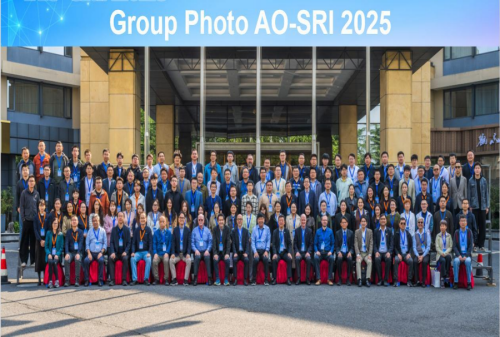To celebrate the 55th anniversary of diplomatic relations between China and Italy, Shanghai Advanced Research Institute (SARI) , Chinese Academy of Sciences (CAS) organized the China-Italy Youth Workshop on Ecological Environmental Protection and Carbon Neutrality (the Workshop) from June 24 to July 5, 2025.The opening ceremony of the Workshop was held at SARI on June 24th. A total of 55 young leaders from universities and research institutions in China and Italyattended the ceremony.President of SARI Prof. Huang Zhengren, President of Italy's National Biodiversity Future Center (NBFC) Prof. Luigi Fiorentino, Director of the Division of European Affairs at the Bureau of International Cooperation of the CAS Mr. Ning Bolun, Director of the Division of European Affairs at the China Science and Technology Exchange Center Mr. Zhang Xiaowei, Researcher at the International Cooperation Department of the Shanghai Municipal Science and Technology Commission Mr. Fu Zhigang, and other representatives attended the opening ceremony.Huang Zhengrenexpressed his expectation that this event would enhance mutual understanding between young leaders from both countries and deepen their awareness of green development, and promote China-Italyfriendship and cooperation as ambassadors in the near future.Luigi Fiorentinodelivered a video speech, hoping that Italian students would deepen their understanding of China through this trip and make positive contributions to China-Italy cooperation in green and sustainable development.Ning Bolun, Zhang Xiaowei and Fu Zhigangdelivered speeches respectively. They highly praised the workshop's significance in promoting China-Italy scientific, technological, and cultural exchanges, expressing high hopes for young students to leverage their strengths to drive more innovative collaborations in the future.Following the launch ceremony, Wei Wei, Vice President of SARI; Jean Paul de Jorio, Chief Legal Officer of NBFC; and Zhong Xin, Director of the Shanghai Chenshan Botanical Garden, delivered messages to the Chinese and Italian youth participants, emphasizing the pivotal role of the younger generation in advancing sustainable development.Prof. Corrado Clini, President of the Italy-China Friendship Association and recipient of the China International Science and Technology Cooperation Award, delivered a keynote speech titled “Development and Cooperation Prospects of China-EU Environmental and Climate Policies”, providing valuable historical perspectives and policy insights to the participants.During the workshop, young leaders engaged in academic seminars, field investigations, and cultural exchanges in Shanghai, Anji, and Beijing. The delegation visited Shanghai Synchrotron Radiation Facility (SSRF), the ShanghaiTech University, Shanghai Chenshan Botanical Garden and the Institute of Botany, Chinese Academy of Sciences in Beijing.The delegation visited the SSRFThe delegation visited the Institute of Botany, Chinese Academy of SciencesA highlight of the Workshop was the trip to Anji, a beautiful county in east China's Zhejiang Province known for its ecological transformation. In Anji, the delegation visited Yu Village,where the Two Mountains concept was first proposed in 2005. Young leaders visited the infrastructure and held seminars with experts on how a village that once relied on heavy industry had reinvented itself into a model of eco-tourism, clean agriculture, and green energy.Seminar held in Yu VillageWorkshop Commencement CeremonyThe Workshop is supported by CAS and NBFC. This workshop represents an important initiative by SARI to actively implement the consensus on China-Italy cooperation in biodiversity and carbon neutrality.<!--!doctype-->










